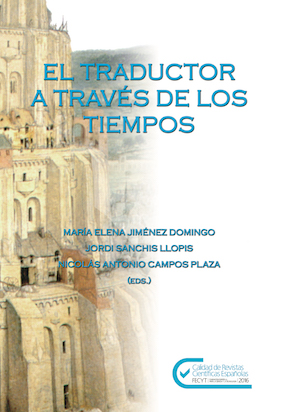The translator as conveyor of our History: Adoración Elvira and the translation of novel metaphor by the writer Agustín Gómez Arcos
DOI:
https://doi.org/10.7203/qfilologia.21.9310 Abstract
Abstract
In the following pages I underscore the role of literary translators as conveyors or our history. A literary translator’s job is mainly associated with the way they handle stylistic effects, faithfulness, musicality, literalness, literariness, adaptation, domestication, etc. whereas the way they approach the subject matter of the translated work is generally ignored. In order to address this lack of attention to the latter matter, I look at metaphors of two novels by Agustín Gómez Arcos which have been translated from French to Spanish by Adoración Elvira Rodríguez.Keywords: literary translation; Spanish history; metaphors.
 Downloads
Downloads
Download data is not yet available.
Downloads
Published
2016-12-03
How to Cite
Arregui Barragán, N. (2016). The translator as conveyor of our History: Adoración Elvira and the translation of novel metaphor by the writer Agustín Gómez Arcos. Quaderns De Filologia - Estudis Lingüístics, 21, 17–38. https://doi.org/10.7203/qfilologia.21.9310
Metrics
Views/Downloads
-
Abstract835
-
PDF (Español)506
Issue
Section
Artículos
License
 Este obra está bajo una licencia de Creative Commons Reconocimiento-NoComercial-SinObraDerivada 4.0 Internacional.
Este obra está bajo una licencia de Creative Commons Reconocimiento-NoComercial-SinObraDerivada 4.0 Internacional.
Authors who publish with this journal agree to the following terms:
- Authors retain copyright and grant the journal right of first publication with the work simultaneously licensed under a Creative Commons Attribution License that allows others to share the work with an acknowledgement of the work's authorship and initial publication in this journal.
- Authors are able to enter into separate, additional contractual arrangements for the non-exclusive distribution of the journal's published version of the work (e.g., post it to an institutional repository or publish it in a book), with an acknowledgement of its initial publication in this journal.
- Authors are permitted and encouraged to post their work online (e.g., in institutional repositories or on their website) prior to and during the submission process, as it can lead to productive exchanges, as well as earlier and greater citation of published work (See The Effect of Open Access).



